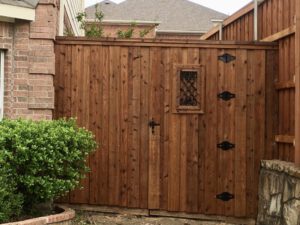Things to Consider Before Hiring a Fence Company
If you’re planning to hire a fence company, there are a few different things to consider. First, you should check with the Better Business Bureau to find out which fence companies have satisfied customers. This website lets you read the reviews of companies and calculate an overall score based on their history of customer satisfaction. If a company is new and doesn’t have many reviews yet, you should ask them for local references so you can get a feel for their reputation.
There are countless styles, colors, and materials to choose from when fencing your property. Fence Companies can design a fence to complement your home’s exterior, landscaping, or property line. They can also accommodate special requests and provide custom fence designs. When selecting a fence, check with your local zoning authority for the requirements and restrictions.
Prefabricated fences are available from lumber yards and home centers. They usually measure three to four feet high and eight feet long. They are also available in several different picket shapes and colors. The most common type is made from pine. Pressure-treated pine is more durable and cost-effective than cedar, but it requires periodic re-coating.
The color of a fence should complement the exterior color of the home. For example, a light-colored house will blend well with the color of a fence. However, if your home’s exterior is darker, you may want to go for a contrasting color.
There are many different materials to choose from, including vinyl. Vinyl fencing is a low-maintenance option. Vinyl is also highly resistant to weather, so it will stay looking great for years to come. You may also want to choose recycled vinyl fencing if you want to save money.
Metal fences are another option for decorative fencing. Some come with delicate vining effects and scrolling curves. These types of fences are used more for garden hedging and property boundaries. While they may not offer privacy, they are elegant and stylish.
In Pennsylvania, contractors are required to call 811 before beginning any digging project. Using the service will ensure that no underground utilities are hit during the excavation process. The service will also mark any area that contains underground utilities to ensure that no one accidentally digs into them. This law may seem onerous, but it is essential that contractors call 811 before beginning any excavation project.
This service is free and easy to use. It is recommended that contractors call 811 two to three days before starting a project. Once the call is placed, a locator will be sent to mark underground pipes and pipelines with paint. Contractors must be very careful when digging around these areas because a utility line is hit every six minutes in the States.
Utility lines are buried almost everywhere, including fences. Hitting one can cut off service, damage property, or cause an accident. In addition, hitting a line can result in fines and even serious injury. Because utility lines change location over time, contractors must call 811 before beginning any excavation project.
For every project involving digging is required to call 811 before beginning. This number can be found on a state’s 811 center’s website. The 811 centers will alert participating utilities of the planned digging. This service also marks underground utility lines. While this service is free of charge, it is essential to call before digging in a residential area.
When it comes to fence maintenance, vinyl fencing is one of the best choices. Not only is it low-maintenance and easy to install, but it can also be cleaned very easily. In fact, you can wash your vinyl fence as often as you like. Unlike metal and wood, the surfaces of vinyl fences are smooth and don’t harbor bacteria or discoloration. In addition, white vinyl fences don’t yellow over time.
Moreover, vinyl fencing is resistant to the harshest weather conditions. Its durable outer shell and soft inner core protect it from water, humidity, and pests. And unlike other types of materials, vinyl fencing also does not rot when exposed to water. Its unique composition of an ultra-rigid polyvinyl chloride homopolymer compound and high level of titanium dioxide pigment allows it to withstand the harshest weather conditions.
